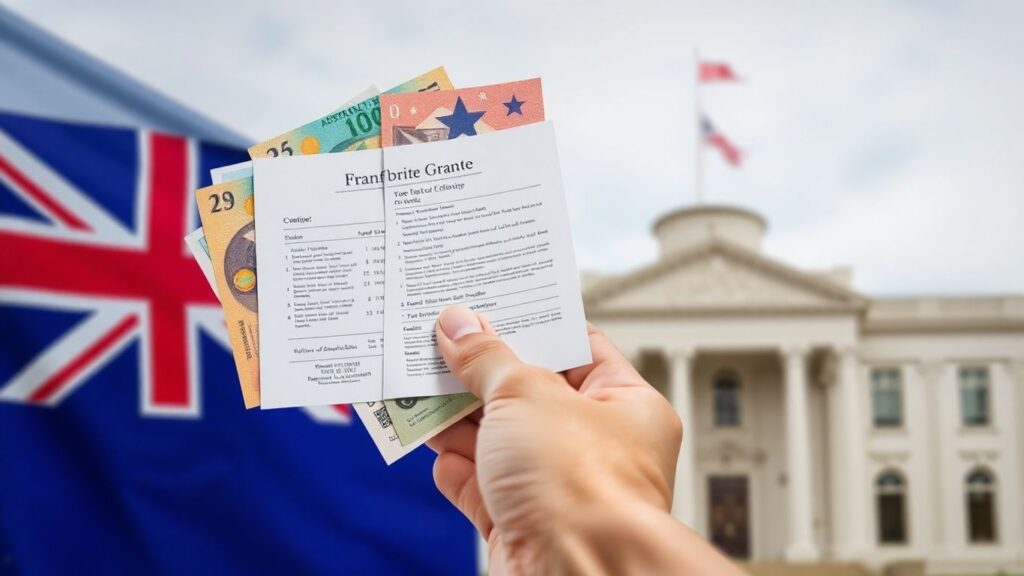Thinking about getting into psychology in Australia and wondering about those DHHS grants? It can be a bit confusing to figure out who actually qualifies for them, especially when you’re just starting out. This article breaks down what you need to know about the DHHS psychology registrar program and related initiatives, so you can get a clearer picture of how it all works and if it’s the right path for you.
Key Takeaways
- The DHHS Psychology Registrar Program is designed to support early-career psychologists in public health settings.
- Eligibility generally requires professional registration as a psychologist and a role within specific public health services.
- Participation in these programs can lead to better professional development and help with job retention in the public health sector.
- Understanding the program structure, application deadlines, and commitment is vital for successful participation.
- While the focus is on psychology registrars, similar initiatives like the Effective Mentoring Program (EMP) support other roles in education and care settings.
Understanding the DHHS Psychology Registrar Program
So, you’re a psychologist just starting out, or maybe you’re a bit further along but aiming for that special endorsement? The DHHS Psychology Registrar Program is something you’ll want to know about. It’s basically a structured way to get the support and supervision you need as you transition from being a student to a fully-fledged professional, especially if you’re looking to work in public health settings. This program is designed to help bridge that gap between academic learning and real-world practice.
Purpose of the Group Supervision Program
Think of this group supervision program as a bit of a safety net and a sounding board. It’s not meant to replace your one-on-one supervisor, but rather to add another layer of support. The main idea is to give you a space to talk through tricky cases, get different perspectives, and really nail down those core competencies the Psychology Board of Australia wants you to have. It started back in March 2017, with funding from the Victorian Government, to get a coordinator on board to actually build and run this thing. This coordinator is a registered psychologist themselves and is also registered as a secondary supervisor, which is pretty handy because it means your time in these sessions counts towards your supervision hours. They run sessions every couple of months, usually for two hours, and cover one of the eight core competencies each time. You’ll do some reading beforehand, present cases, and have a good old chat with everyone else.
Target Audience: Early-Career Psychologists
This program is really aimed at those psychologists who are in the early stages of their career. This includes recent graduates who are just starting out and those who are undertaking a registrar program to get their endorsement. It’s for people who are finding the jump into the workforce a bit challenging, which, let’s be honest, most people do. It’s tough going from textbooks to dealing with actual people and complex situations. The program acknowledges that there can be barriers to getting the right supervision and meeting all the requirements, especially if you’re working part-time or in a role that doesn’t cover all the areas you need for your endorsement. It’s about making sure these early-career folks don’t feel lost at sea.
Program Structure and Content
The group supervision sessions are pretty regular, happening every two months, so you get about six sessions a year. Each session is two hours long and focuses on one of the eight core competencies required by the Psychology Board of Australia. Before you even get to the session, you’ll have some pre-reading to do. Then, during the session, you’ll get to present cases, reflect on your own practice, and have group discussions. It’s all about building on what you already know and developing new skills. The content is generally seen as relevant to what people are actually doing in their jobs, and the feedback has been pretty positive. People seem to really value the chance to connect with other early-career psychologists and share their experiences. It’s a bit of a mix of learning, sharing, and just generally figuring things out together.
The program aims to provide a supportive environment where psychologists can gain supervision, build their skills, and ease their transition into professional practice within public health settings. It’s designed to complement, not replace, primary supervision arrangements.
Eligibility Criteria for DHHS Grant Program Participation
So, who actually gets to be part of these DHHS grant programs? It’s not just a free-for-all, and there are some specific boxes you need to tick. Generally, these grants are aimed at supporting professionals working within the Australian public health system, particularly those in the early stages of their careers.
Who Qualifies for DHHS Grant Program in Australia
To be considered for a DHHS grant, you’ll typically need to be an Australian citizen or permanent resident. You also need to be actively working within a recognised public health setting. This usually means you’re employed by a state or territory health department, a public hospital, or a similar government-funded health service. The focus is on building the capacity of the public health workforce.
Specific Roles within Public Health Settings
While the grants are broad, they often target specific professional groups. For psychology, this commonly includes:
- Psychology Registrars: Those undertaking supervised practice to gain full registration.
- Early-Career Psychologists: Recently registered psychologists looking to further develop their skills.
- Intern Psychologists: Students undertaking mandatory placements.
Sometimes, roles that involve direct service delivery or program support within public health initiatives are also prioritised. It’s worth checking the specific grant guidelines, as they can vary.
Professional Registration Requirements
This is a big one. To participate in programs like the Psychology Registrar Program, you absolutely must hold provisional or full registration with the Australian Health Practitioner Regulation Agency (AHPRA). Without this, you won’t be eligible. You’ll likely need to provide evidence of your current registration status as part of your application. It’s a good idea to make sure your registration is up-to-date before you even start looking into grant opportunities. You can find more information on registration requirements on the AHPRA website.
It’s important to remember that these grants are designed to support the development of professionals who are committed to working within and contributing to Australia’s public health services. They are not typically for private practice or research outside of this scope. Always read the specific grant documentation carefully to avoid disappointment.
Applying for grants can sometimes feel a bit like a maze, but understanding these basic eligibility points is the first step. If you’re keen to get started with grant applications, you might want to register with GrantConnect to stay informed about available opportunities. You can also subscribe to the Community Grants Hub for notifications. Register with GrantConnect.
Benefits and Outcomes of DHHS Supported Initiatives

Enhanced Professional Development
Participating in DHHS-supported programs can really give your career a boost. It’s not just about ticking boxes; it’s about gaining practical skills and knowledge that make you a better psychologist. You get to work on real-world projects, often collaborating with experienced professionals. This hands-on experience is invaluable for building confidence and competence.
Improved Recruitment and Retention
These initiatives are designed to attract and keep talented psychologists in the public health sector. By offering structured support and development opportunities, the DHHS aims to make these roles more appealing. This means more psychologists are likely to stay in their positions, leading to a more stable and experienced workforce.
Contribution to Public Health Workforce
Ultimately, these programs contribute to a stronger public health system. When psychologists are well-trained, well-supported, and committed to their roles, the community benefits. It means better access to mental health services for those who need them most. The focus is on building a capable and dedicated workforce ready to meet the challenges of public health.
The goal is to create a positive cycle where supported professionals are more likely to stay in public service, thereby improving the quality and availability of mental health care for the wider community. This focus on sustainability and professional growth is key to addressing long-term workforce needs.
Navigating the Application and Registration Process
Getting involved with the DHHS grant program means you’ll need to get a handle on how to apply and register. It’s not usually a super complicated process, but paying attention to the details is key. You don’t want to miss out because of a small oversight, right?
Key Dates and Registration Periods
This is probably the most important bit. The program has specific windows for when you can apply and register. Missing these means you’ll have to wait for the next cycle. It’s a good idea to mark these dates in your calendar as soon as they’re announced. They usually release this information well in advance, so you have plenty of time to prepare your application.
- Application Opening: Typically announced in late Spring, giving you a few months to get your paperwork sorted.
- Application Closing: Usually falls in late Summer or early Autumn. Don’t leave it to the last minute!
- Notification of Outcome: You can expect to hear back within a few weeks to a couple of months after the closing date.
- Program Commencement: The actual start date for successful applicants, often at the beginning of the next financial year.
Contacting Program Administrators
If you’re unsure about anything, or if you’ve got a specific question about your situation, reaching out to the people running the program is your best bet. They’re there to help guide you through the process. Look for an email address or a phone number on the official DHHS grant program website. Sometimes, there’s a dedicated inbox for inquiries, which can be really helpful for tracking your communication.
It’s always better to ask a question upfront than to make an assumption that could lead to a rejected application. They often have FAQs on their site too, which might answer your query straight away.
Understanding Program Commitments
Before you sign up, make sure you understand what’s expected of you. This isn’t just about getting the grant; it’s about participating fully in the program. This might include:
- Attending regular group supervision sessions, which are usually scheduled every couple of months.
- Completing any pre-reading or preparation work for these sessions.
- Actively participating in discussions and case presentations.
- Potentially contributing to program evaluations or feedback surveys.
These commitments are designed to help you get the most out of the program and contribute to the overall success of the DHHS initiatives. It’s a two-way street, after all.
Distinguishing DHHS Programs: A Closer Look
The Department of Health and Human Services (DHHS) in Australia runs a few different programs aimed at supporting psychology professionals, especially those starting out. It’s easy to get them mixed up, but they each have a slightly different focus. Let’s break down a couple of them so you know what’s what.
Psychology Graduate and Registrar Support
This program is pretty much what it sounds like. It’s designed to help psychology graduates and registrars as they work towards full registration. Think of it as a structured pathway to becoming a fully qualified psychologist. It often involves specific training modules, supervision requirements, and sometimes even financial assistance to ease the transition from study to practice. The goal here is to build a strong foundation for early-career psychologists working within the public health system.
Effective Mentoring Program (EMP)
While the registrar support focuses on the formal requirements for registration, the Effective Mentoring Program (EMP) is a bit broader. It’s all about the quality of the guidance you receive. This program aims to pair up less experienced psychologists with seasoned professionals who can offer advice, share their experiences, and help develop skills beyond just the technical aspects of the job. It’s less about ticking boxes for registration and more about fostering professional growth and resilience. The EMP really emphasises the ‘art’ of being a psychologist, not just the science.
Distinguishing Grant Program Focus
So, where does the DHHS Grant Program fit in? This grant program is often tied to specific initiatives or projects within the public health sector. It might fund a particular service, a research project, or an innovative approach to mental health care. While it supports psychologists, the funding is usually directed towards the outcome of the project rather than directly funding an individual’s registration pathway like the registrar support might. It’s about advancing public health goals through psychological expertise.
Here’s a quick rundown:
- Psychology Graduate and Registrar Support: Focuses on meeting registration requirements and building foundational skills for early-career psychologists.
- Effective Mentoring Program (EMP): Concentrates on professional development, resilience, and the broader skills needed for a long-term career.
- DHHS Grant Program: Funds specific projects or initiatives within public health, utilising psychological skills to achieve defined outcomes.
Understanding these distinctions is key. It helps you identify which DHHS initiative best aligns with your career stage and professional goals, whether you’re aiming for registration, seeking advanced mentorship, or looking to contribute to a specific public health project.
The Role of Supervision in Professional Growth

Meeting Core Competency Requirements
Supervision is really the backbone of becoming a registered psychologist in Australia. It’s not just about ticking boxes; it’s about actually learning the ropes and making sure you’re up to scratch on all the skills you need. The DHHS grant program, for instance, often ties into this by providing structured group supervision that specifically targets these core competencies. Think of it as a guided tour through the essential skills you’ll use every single day.
Supervision Hours and Accreditation
Getting those supervised hours logged is a big part of the registration puzzle. The group supervision sessions offered through programs like this can count towards your total, which is a massive help. It means you’re not just getting the experience, but it’s also formally recognised. The key is that the supervision needs to be delivered by someone accredited, like a registered psychologist who’s also a secondary supervisor. This ensures the hours you’re clocking are legitimate and contribute to your pathway to full registration.
Facilitating Transition to Professional Practice
Moving from being a student to a practicing psychologist can feel like a huge leap. Supervision, especially the group kind, offers a safe space to talk through the tricky bits. You get to hear about other people’s experiences, share your own challenges, and get advice from both peers and supervisors. It really helps smooth out that transition, making you feel more confident and prepared for the real world of psychology practice. It’s about building that professional identity.
The structured nature of these programs means you’re not left to figure everything out on your own. You get regular feedback, opportunities to reflect on your cases, and a support network that understands the journey you’re on. This kind of consistent guidance is what helps build confidence and competence.
Here’s a quick look at what supervisors reported:
| Aspect of Supervision | Pre-Group Attendance | Post-Group Attendance |
|---|---|---|
| Supervisor Confidence in Core Competencies | 58% | 68% |
| Perceived Workload for Supervision | 72% | 63% |
This shows that having access to structured group supervision can actually make the supervisor’s job feel a bit easier and boost their confidence in the registrar’s development.
Wrapping Up: Who Can Get a Piece of the DHHS Pie?
So, we’ve looked at how the DHHS grant program works and who might be able to get involved. It’s not always straightforward, and the details can change, so it’s a good idea to keep an eye on official announcements. If you think you or your organisation might fit the bill, doing your homework and checking the specific requirements for any given grant is the best way forward. Don’t be afraid to reach out to the DHHS or the program contacts if you need more clarity. Getting the right support can make a big difference, and understanding the eligibility is the first step.
Frequently Asked Questions
What exactly is the DHHS Psychology Registrar Program about?
Think of it as a special support system for new psychologists in Australia, especially those working in public health. It’s designed to help them get the extra supervision and training they need to become fully registered and confident in their roles. It’s all about making sure they get the best start in their careers.
Who can actually join this DHHS program?
Generally, it’s for psychologists who are just starting out, like graduates or those doing their registrar program. You usually need to be working in a public health setting, like a hospital or community health service, and meet certain professional registration requirements set by the Australian Health Practitioner Regulation Agency (AHPRA).
What sort of things do you learn or do in the program?
The program usually involves group supervision sessions. These sessions cover important topics related to the core skills psychologists need. You’ll often do some reading beforehand, share case examples, think about your own experiences, and chat with others in the group. It’s a chance to learn from experienced supervisors and your peers.
How does this program help with getting fully registered?
A big part of becoming a registered psychologist is getting enough supervised experience. This program often counts towards those required supervision hours. It helps ensure you’re meeting all the necessary standards and competencies set by the Psychology Board of Australia, making your path to full registration smoother.
Are there other DHHS programs I should know about?
Yes, the DHHS supports various initiatives. For example, there’s the ‘Effective Mentoring Program’ (EMP) which helps experienced teachers mentor new teachers. It’s important to know which program is right for you, as they have different focuses. The psychology registrar program is specifically for those on the path to becoming endorsed psychologists.
What are the main benefits of being part of this program?
It’s a fantastic way to boost your professional skills and confidence. You get valuable supervision, learn from others, and feel more supported as you transition into working life. For employers, it helps attract and keep good psychologists, which ultimately strengthens the public health system.





